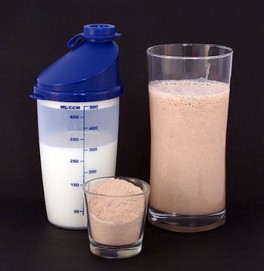Minimally, following a practice or match a tennis player should consume a beverage containing carbohydrate and electrolytes, such as a sports drink. Studies have shown that this combination can impact post-exercise recovery. However, the traditional sport drink involved a carbohydrate solution containing between 4-8% carbohydrates with some electrolytes. The latest research shows that when protein is added to a carbohydrate-electrolyte mixture there are significant additional benefits.
For example, researchers from the University of Texas and Montana State have published studies showing that a carbohydrate-protein sports drink (80% carbohydrate, 20% protein), when compared to a carbohydrate-only sports drink, improved every measurement of muscle recovery, resulting in less muscle damage, better replenishment of muscle energy stores, faster rebuilding of muscle protein and even superior rehydration. It’s not surprising, therefore, that the carbohydrate-protein drink has also been shown to improve endurance performance in a subsequent workout up to 16 hours later. Other studies have also shown that the addition of this small amount of protein to these recovery beverages reduces fluid loss due to urination (which means the athlete stays better hydrated) and retains more fluid to help improve the quality of the recovery period.
Below are some simple recommendations that can help tennis athletes (coaches and parents) decide the best recovery beverage to consume after tennis practice or competition sessions to help improve the quality of recovery.
WHAT TO EAT
- High Glycemic Carbohydrate: this helps move the other nutrients (protein, electrolytes, vitamins and minerals) to the depleted muscles quicker
- Fast Acting Protein – whey protein is the fastest acting protein source
- Within 15-45 minutes
- 1.0-1.5 grams of carbohydrates per kilogram of bodyweight (American College of Sports Medicine/American Dietetics Association 2009 recommendations)
- 2.5:1 – 4:1 (Carbohydrate:Protein Ratio)
- Minimum 10 grams of protein
- On average 200-300 calories for most normal individuals





 RSS Feed
RSS Feed
